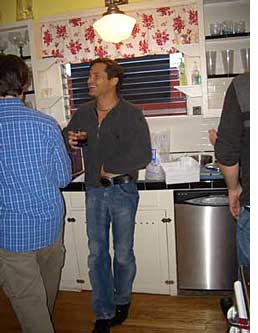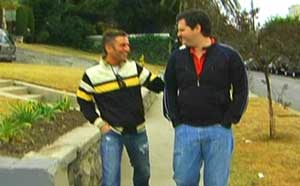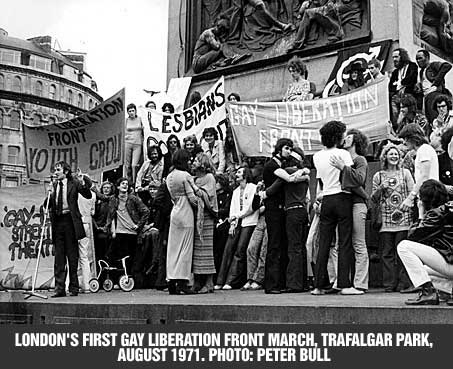
 |
||||||
|
GAY
FILM REVIEWS BY MICHAEL D. KLEMM
|
||||||
|
Out
of The South Director/Writer: Starring: Unrated, 53 minutes
After Stonewall First
Run Features
Director: Narrated
by: Starring: Unrated, 88 minutes |
Forging
Identity
Without the existence of documentaries, just think of the stories that would never get told. Everyone experiences being gay in their own way and it's sometimes hard to put yourself into someone else's shoes, or to see things from the other side of the tracks. That's why I shouldn't allow my own arrogance to automatically assume that growing up gay in the Bible Belt has to have been a fate worse than death. Jason Ball's new documentary, Out Of The South, is about six gay men who "traded cotton fields for freeways" to live in L.A. but "never left the South behind." Ball gathers them together for a traditional Sunday dinner like the ones they enjoyed back home with family and friends. They share stories about their childhoods and debate the tastiest way to fry okra. |
|
|
|
 Our
Southern gentlemen have managed to reconcile the pain that also comes with
their feelings of nostalgia. Each claims a personal relationship with God.
"In the South," the director asserts, "You don't ask do you go to
church, you ask what church do you go to?" According to one speaker, (who
was convinced that he would be going to Hell), the church can be a home
and then something to run away from. Each speaks of varying degrees of acceptance.
One was sent to counseling (which only served to affirm his sexual
identity), another's mother changed priests until she found one that would
accept her son. "I don't think that God would give you a gift like sex and
love," Ball insists, "and then say that you can't do it like this." He remarks
that his family finally accepted that he was probably born this way but
then told him that he shouldn't act on it. They have since grown more liberal
in their views; while they might not join PFLAG or tell their neighbors,
they are glad their son is with someone and not alone. Our
Southern gentlemen have managed to reconcile the pain that also comes with
their feelings of nostalgia. Each claims a personal relationship with God.
"In the South," the director asserts, "You don't ask do you go to
church, you ask what church do you go to?" According to one speaker, (who
was convinced that he would be going to Hell), the church can be a home
and then something to run away from. Each speaks of varying degrees of acceptance.
One was sent to counseling (which only served to affirm his sexual
identity), another's mother changed priests until she found one that would
accept her son. "I don't think that God would give you a gift like sex and
love," Ball insists, "and then say that you can't do it like this." He remarks
that his family finally accepted that he was probably born this way but
then told him that he shouldn't act on it. They have since grown more liberal
in their views; while they might not join PFLAG or tell their neighbors,
they are glad their son is with someone and not alone. |
|
 Another
speaks about not realizing that he was different until someone asked him
why he didn't like football. "Once you become aware of it, you stay aware
of it," he says, commenting on the "shameful self image" he had of himself.
He looked for answers in book stores but always found them in "the chapter
on abnormal pyschology." They share a common lament that there was no one
in the media who was gay when they grew up and one, referencing Three's
Company, says his lone influence was somebody on TV who was pretending
to be gay. I kept waiting for someone to recount an extreme horror story
and, just when I was beginning to think that growing up gay in the South
was no different than anywhere else, one tells how he was beaten and sodomized
with a broomstick by the rest of his swim team when they found out he was
a fag. Ultimately, each says that they had to leave the South so
that they wouldn't stand out, but they all add that they wouldn't trade
growing up there for anything. Another
speaks about not realizing that he was different until someone asked him
why he didn't like football. "Once you become aware of it, you stay aware
of it," he says, commenting on the "shameful self image" he had of himself.
He looked for answers in book stores but always found them in "the chapter
on abnormal pyschology." They share a common lament that there was no one
in the media who was gay when they grew up and one, referencing Three's
Company, says his lone influence was somebody on TV who was pretending
to be gay. I kept waiting for someone to recount an extreme horror story
and, just when I was beginning to think that growing up gay in the South
was no different than anywhere else, one tells how he was beaten and sodomized
with a broomstick by the rest of his swim team when they found out he was
a fag. Ultimately, each says that they had to leave the South so
that they wouldn't stand out, but they all add that they wouldn't trade
growing up there for anything. |
|
|
It's wrong to think in terms of stereotypes but, when I thought of the South, I'd always pictured Jesse Helms, Deliverance, confederate flags and Neil Young's "Southern Man." These men made me open my eyes a bit more and look at it differently. Each has a good attitude, is comfortable with himself, and retains the manners, hospitality and friendliness that they remember from their youths. Out of the South is about how these men forged their own identities because of their upbringing and not in spite of it. The director, in addition to making this film, has also established the Sunday Dinner Legacy Project to collect the stories of gay men and women who grew up, or still live, in the South. To contribute your own tale, log on to outofthesouth.com
|
|
 |
|
|
Fourteen years separate these two PBS documentaries, but 1999's After Stonewall picks up the story where 1985's superb Before Stonewall left off. Narrated by out singer Melissa Etheridge, After Stonewall does an admirable job, using newsreel footage and contemporary talking heads, to survey the 30 year history of gay activism since the Stonewall Riots of 1969. Both films were directed by John Scagliotti, the Creator and Executive Producer of In the Life, the first gay and lesbian national series on PBS. After opening the film with a hilarious clip from South Park, wherein a cheering rally becomes silent when the speaker screams "It's good to be gay," After Stonewall commences with footage of Stonewall before proceeding to explore its aftermath. Along the way, we watch the formation of the first gay rights groups, the ensuing sexual liberation of the 1970s, the political shift of the Reagan years and its response (or lack thereof) to the AIDS pandemic, the formation of ACT-UP, the first marches on Washington, the euphoria surrounding the election of Bill Clinton and the anger over his subsequent back-pedaling on gay issues, the national coming out of Ellen Degeneres, and the killing of Matthew Shepard. ("The Bush Years" were still in the future.) |
|
|
This is an important history lesson and, because the participants are queer, you know that none of this will be boring. Some of it is uplifting, some of it is shocking, some of it is quite funny. Take, for example, how the early gay rights organizations overturned the American Psychiatric Association's classification of homosexuality as a mental illness. A closeted psychiatrist was found who agreed to speak at the 1973 American Psychiatric Association Convention, provided that he could wear a wig and a mask to hide his identity. He looked ludicrous but still succeeded in making his case. Circle of Friends founder Phil Johnson remarks how gays were "cured overnight" now that we were no longer categorized as being mentally ill. Emboldened by the ruling, we came out in huge numbers and began to celebrate our sexuality. An era of free love exploded. In the more carefree days, before AIDS came along and crashed the party, the general atmosphere was one of hope. Author Dorothy Allison (Bastard Out Of Carolina) remembers that "everyone of us felt like we had history in our hands." But there was also dissension within the ranks and women split to form their own movements. Many were dismayed when feminist Betty Friedan called them "the lavender menace" and warned that lesbians would ruin the Woman's Movement. Writer Rita Mae Brown (Rubyfruit Jungle) humorously recounts how she was thrown out of NOW because she called it "Now WHAT?" The 1980s ushered in the Reagan era and the loss of many gains. For anyone who needs a reminder, Ronald Reagan is seen giving a very negative speech at the Republican Convention in which he firmly states that he does not agree with our request for acceptance. The meat of any documentary, along with its interviews, is how well it uses archival and pop culture footage to illustrate the narrative. Hearing the words straight from Reagan's mouth is far more visceral than any third-party reporting could ever be. The cutting is also very effective in this sequence. Video of Reagan standing with the darling Rev. Jerry Fallwell (who wanted to change laws in order to outlaw us) is followed by androgynous singer Boy George performing "Do You Really Want To Hurt Me?" in a stage courtroom before an angry judge. Playwright Craig Lucas' remembrance of how his friends called each other to ask if they had seen the alarming article in The New York Times about a "gay cancer," is accompanied by the opening scene from the film that he later wrote, 1990's Longtime Companion, in which the actors all do the same. |
|
|
[On a quick note, unrelated to the film, why is it that Conservatives always label judges who pass pro-gay legislation as "activist," but they never use the "A" word when referring to whackos like Anita Bryant? Just wondering.] There is a glimmer of light in the 1990s. The third March on Washington receives media attention when it is covered live on CSPAN. At the 1992 Democratic Convention, Bill Clinton becomes the first Presidential candidate to include the gay community. Unfortunately he would cave in to Conservatives. But winds of change were coming, though the new visibility also brought out hatred, hostility and fear in others. There is still a long way to go. As the documentary winds down, many agree that the most important thing that gays have done is come out of the closet, creating visibility and challenging outdated notions of family and gender. The film ends on an utterly charming note as activist Barbara Giddings (she was one of the founders of the Daughters of Bilitis in the 1950s) talks about someday sitting in a rocking chair at a gay retirement home and saying "Do you remember when we picketed the White House in 1965?" |
|
|
It is also regrettable that the filmmakers commit the cardinal documentary sin by often not identifying the figures on screen and leaving too many important events without dates. To cite two brief examples, out actor Ian McKellen is not identified when he speaks at the March on Washington, and neither is the virulently homophobic Rev. Fred Phelps when his group protests at Matthew Shepard's funeral. Any gay man or woman watching this film today will probably recognize them but what about in another ten years? You're not supposed to have to consult Cliff Notes when watching a documentary. But, this quibble aside, After Stonewall is a terrific documentary and a wonderful companion to its predecessor, Before Stonewall. While neither is a complete study, both are essential - and entertaining - viewing for anyone with an interest in our history. See
also:
|
|
|
|